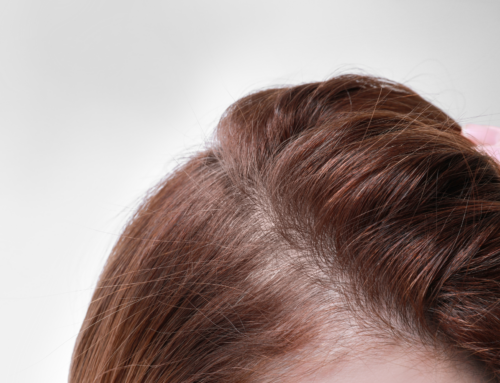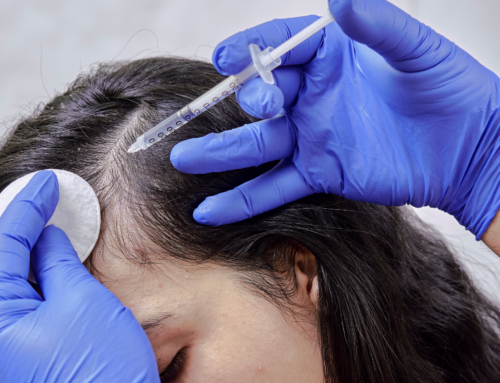The most common cause of hair loss is Dihydrotestosterone (DHT). When testosterone, a steroid hormone responsible for the development of male secondary sexual characteristics, produced in the testes (and the ovaries and adrenal cortex), is converted to DHT by the 5 Alpha Reductase enzyme (5AR), the result is hair shrinkage, and ultimately, death.
When the DHT attaches to the androgen receptors on the hair follicle, it causes the hair to diminish and miniaturize. The miniaturized hair follicle eventually dies and hair loss occurs.
One of the most powerful and effective ways to stop hair loss is with 5a-reductase Inhibitors (5-ARIs), which are also known as dihydrotestosterone (DHT) blockers. Many inhibitors are medications that are anti-androgenic – they are used primarily in the treatment of enlarged prostates and androgenic alopecia (pattern hair loss). These blockers inhibit the 5AR by preventing testosterone from converting into dihydrotestosterone.
Some of the more well-known 5a-RIs include Finasteride (brand name Propecia), which works by decreasing the circulation of DHT levels by 70%. Other 5a-RI drugs include Alfatradiol, Duasteride, Epristeride, and Permixon (Saw Palmetto extract).
Monoxidil (Rogaine) is the second most used topical treatment for hair loss. Besides prolonging the anagen/growth phase of the hair cycle, Minoxidil has been shown to increase the diameter of existing hair follicles. It also increases prostaglandin synthesis, and upregulated growth factors, as well as increasing blood flow in the area where it is applied. It’s also known to activate the ß-catenin pathway in the dermal papilla cells. It is considered anti-androgenic, meaning it may suppress androgen receptor-related functions.
There are a few alternatives to medications, when it comes to inhibiting the 5-Alpha Reductase, there are some phytochemical compounds (produced by plants), that have been proven to be effective. They include: zinc, riboflavin, copper, azelaic acid, ß-Sitosterol, polyphenols, Alizarin, curcumin of turmeric, green tea catechins, EGCG, Valoneic acid dilactone, garden balsam, rose balsam, Reishi mushroom (ganoderic acid) Chinese Knotweed, Black Pepper leaf extract, Red Stinkwood, Saw Palmetto, pine, Ku Shen, Eastern Arborvitae, Gamma-Linolenic acid, alpha-linolenic acid, linoleic acid, palmitoleic acid, oleic acid, coconut kernel, and Amia. These have limited testing in human clinical trials so their treatment potential is unknown.
Other options for hair loss include growth factors, which are protein molecules that are naturally produced by the body, and stimulate cellular growth and function. They also regulate cell division and cell survival and bind to receptors on the cells’ surface that activate cellular proliferation. These rejuvenating properties support a natural and safe process that aids in the improvement and appearance of thinning, balding, and aging hair and skin.
A more recent discovery called Fgf9, believed to help people with hair loss, is initially secreted from gd T cells, a rare subset of T cells involved in the immune response. Once released, Fgf9 serves as the catalyst for a signal sent via the dermal Wnt pathway. The signal prompts further expression of Fgf9 in structural cells called fibroblasts and adds to the generation of new hair follicles.
Other growth factors that are currently being tested and used in helping with hair growth include IGF-1, the insulin growth factor, VEGF, vascular endothelial growth factor, epidermal growth factor (EGF), fibroblast growth factor FGF-1, FGF-2, FGF-5, FGF-7, Keratinocyte growth factors (KGF), Nerve Growth Factor NGF, Platelet-derived Growth Factor (PGDF) Platelet Rich Plasma (PRP), and Transforming Growth Factor Beta 1, or TGF-ß1.
In addition to inhibiting the 5-Alpha Reductase, many of these growth factors can significantly offer, enhance and fortify the body’s natural ability to stimulate collagen, for optimal repair and regeneration. More studies are required on the efficacy and long-term safety of growth factors, but the results look promising.
If you are experiencing hair loss, seek professional advice. Schedule a telehealth consultation with Misti Barnes, our expert trichologist, to address your concerns and explore telehealth solutions. Alternatively, if you’re located in the Sarasota or Bradenton area, feel free to contact us for an in-person office consultation at (941) 909-7701.
Your hair and health matter. We’re here to help you find the best solutions.





